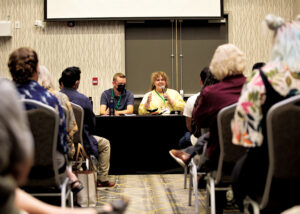What are your church attendance patterns like? Special occasions only? Once every couple of months? Every other week? Every Sunday?
If your church attendance patterns have become less frequent over the last few years, you are not alone. Statistics show young people aren’t attending religious services as frequently as they did 20 years ago.
According to a Statistics Canada General Social Survey, in 1995, 15- to 24-year-olds were the least likely to attend religious ceremonies frequently, or once a week, at 22.6 percent. This age group was also the most likely to attend church less frequently than once a week, at 55 percent. Just a few years older, 24.5 percent of 25- to 44-year-olds attended once a week, while 50 per cent attended less frequently.
In 2005, those numbers dropped. Just over 15 percent of 15- to 24-year-olds attended at least once a week; just over half attended less frequently. Just under 16 percent of 25- to-44-year-olds attended once a week, while 48.2 percent of these people attend less frequently.
Megan Enns, 25, of Foothills Mennonite Church in Calgary, is one of those young people who doesn’t attend her church very regularly, citing her work as a peace and youth engagement coordinator for Mennonite Central Committee Alberta as a factor.
“Because I do so many weekend events, trips, and visit other churches, that significantly affects my attendance at my own church,” she says. “But it’s also my choice not to attend very regularly.”
Enns values community in her life. Although she says she does find it at church, she feels supported and motivated by the community of faith in her work environment and through her group of friends as well. And while she’s been involved with her church as a youth sponsor and a mentor, Enns doesn’t believe attending church is the only way to support others or feel supported by a community of faith.
“They’re available at church, but I have them elsewhere,” she says of her spiritual support. “Church isn’t the one place I get them.”
On the other hand, some young Mennonites still try to attend church every week.
Jennifer Regehr, 26, attends Erb Street Mennonite Church in Kitchener, Ont., as often as she can.
“I think that creating a habit of doing something affects the way you think about things,” she says. “Creating a habit of regular [church] attendance reinforces the importance of Christianity in my life.”
Regehr admits that it was more difficult to attend church regularly when she was a student at McMaster University in Hamilton, Ont. “When I was at university I attended less regularly because my sleep schedule was messed up,” she says. “My alarm clock would go off and I would be like, ‘Nope, not happening,’ and would go back to sleep. . . . It’s better now that I have a 9-to-5 job, so my sleep schedule is somewhere approaching normal,” noting, though, that she still made an effort to make it to church as often as she could during her university years.
James Dueckman, 23, is a member of Emmanuel Mennonite Church in Abbotsford, B.C. He is a medical student at the University of British Columbia and lives in Vancouver. Although he doesn’t always make it home for church on Sunday, he does worship with a congregation in Vancouver.
For Dueckman, church and community are synonymous, which is why he prioritizes regular attendance. “At Emmanuel, all my friends growing up were there. And in the last couple of years, all my really good Abbotsford friends are there every Sunday.”
When he’s in Vancouver, Dueckman attends church with his roommate. Both are very busy, so church is a good place for them to spend time together.
Dueckman says, though, that his attendance may drop when he gets into his third and fourth years of medical school, and his schedule becomes less predictable. Currently he’s able to get most of his work done during the week and on Saturday.
Gordon Zerbe, a New Testament professor at Canadian Mennonite University in Winnipeg, believes young people’s infrequent church attendance can result from a number of things, including the fact that young adults are more transient than ever.
“The duration of the in-between zone between coming of age and becoming an adult is now longer,” he says, adding that young adults often have difficulty getting settled into a career, and often have to get more education in order to reach their career goals. They are also getting married and having children later, and are generally taking longer to reach “adulthood” than their parents and grandparents did.
In his experience, Zerbe says that, when young adults become settled, their church attendance becomes more regular. And when the roles of young people are re-imagined in the church, these people respond well.
“My daughter was invited to be chair of our church’s Youth and Young Adult Committee,” Zerbe says. “Young adults are supposed to be the babysitters, but to give it another angle was a draw for her, like the church was taking her input seriously. It put her in a place of responsibility and helped her take ownership of her role in the church.”
–Posted March 26, 2014
See also: Who are the millennials?







Leave a Reply
You must be logged in to post a comment.